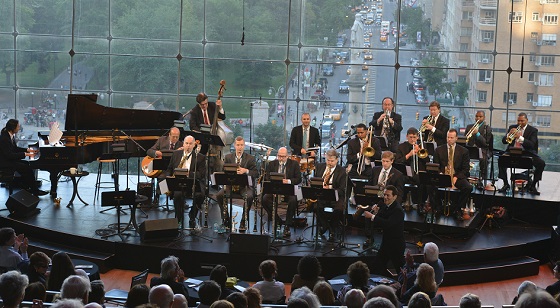The backdrop is hard to beat. Motorists driving from and towards Columbus Circle begin turning on their headlights as magic hour gives way to a rainy spring evening. A haze engulfs the hovering statue of this hemisphere's fabled discoverer, moisture settles in on the lush, lower half of Central Park and as the band begins to play, a portal to another era is opened. This is Swinging with the Big Bands at Jazz at Lincoln Center and if the powerful and emotive Sounds of Swing are something that fill you with romantic joy then, unless you possess powers of time travel, you couldn't do much better this.
Closing out this season's Jazz & Popular Song Series at Jazz at Lincoln Center, Michael Feinstein assembled a virtual battalion of Big Band pros to remind all who were there to listen to what popular music used to sound like when there were more than four or five instruments in the mix. Enlisting the likes of Vince Giordano and the Nighthawks, Wynton Marsalis and his resident players, and a trio of guest vocalists, Feinstein makes his greatest contribution as the magnet pulling these forces together as well as the name that can draw a crowd to hear them.
Feinstein's love of this music is indisputable, and his taste in current-day artists only goes to support his understanding of the Sound. Vince Giordano and the Nighthawks are a National Treasure that New York City should consider itself blessed to have in residence. It's ironic that we should live in an era where NYC should have lost the Rock 'n' Roll credibility that it maintained up until only a few short decades back, yet hold firmer and more sincerely to the roots of the Jazz Era that thrived in its clubs and dance halls eight decades ago. Giordano and his compatriots can fill most any room with their wonderful sound, which beats with a contemporary fervor, unhampered by what would be a natural nostalgia, while holding true to notes and melodies that predate the births of any in their numbers. Any opportunity to hear the Nighthawks is one that should be jumped on; an occasion to hear them in such a setting with such added vocalists and musicians is truly epic.
Wynton Marsalis's seeming humility is only outdone by skills and abilities that would make such humility seem impossible. He must be well aware of what he uniquely offers with his trumpet, and his collaboration in this is series is the gasoline which turns a fire into an inferno. Adeptly utilizing contrast and intonation, Marsalis blows to knock an audience down and yet can pull back to a quiet intensity that actually shrinks the size of room, breathing it in to listen to the brass magic he has to dictate.
Guest vocalists Sachal Vasandani, Nellie McKay, and Connie Evingson are the icing on this already so-rich cake, representing the historic and varied roles that featured singers played during the Big Band Era. McKay sways with an energetic joy, smiling as she christens the notes that she clearly holds so dear and looking as if she could have just stepped off Boeing C-108 ready to sing for our troops on the European front. Vasandani is in possession of vocal chords of a greater vintage than the rest of him. Smooth, deep, cradling every note like an infant child or much-desired lover, he even manages to provide charm to the evening's only misguided selection, "Girl Talk," which squawks with its rusty lyrics, patronizing with goo-goo misogyny. Evingson provides a sultrier note, offering variety and seduction to this impressive threesome.
As nature's lights faded on the backdrop to the scene and the city answered with its ever-present Midtown glow, the music came to an end and the audience was returned safely and somewhat sadly to the Twenty-First Century. However, just as the lights of Times Square have a way of bleeding beyond their intended parameters, so did the resonating songs slip out of The Allen Room, lingering in the ears and hearts of its audience, nestling in the part of the soul that longs for love, romance, and a time when this world might have made a little more sense.

